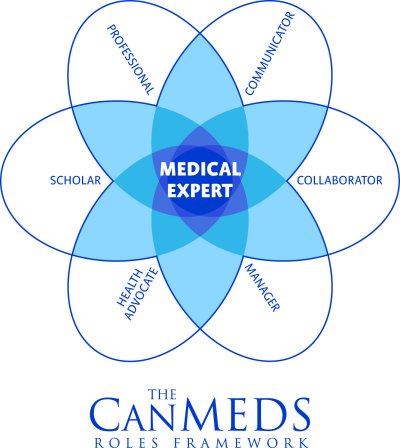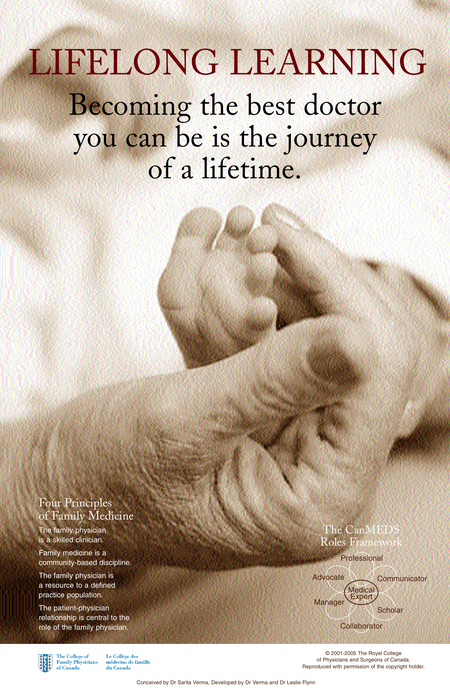



The CanMEDS Framework
The Royal College Mission:
An organization of medical specialists dedicated to ensuring the highest standards and quality of health care.

The CanMEDS framework is a guide to the essential abilities physicians need for optimal patient outcomes. Fundamentally, CanMEDS is an initiative to improve patient care. The framework defines the competencies needed for medical education and practice. This framework of core competencies are organized thematically around 7 key physician Roles:
Medical Expert
Communicator
Collaborator
Manager
Health Advocate
Scholar
Professional
The CanMEDS name, which has become well known nationally and internationally, is a derivative from "Canadian Medical Education Directives for Specialists". The CanMEDS diagram graphically illustrates the centrality of the Role of Medical Expert. The diagram also shows the interconnectedness of the other Roles.
The CanMEDS initiative began in the 1990’s by the Royal College of Physicians and Surgeons of Canada. In the context of a rapidly changing health care environment, it was felt that the roles and abilities required of physicians needed to be further defined and explored. The College identified patient consumerism, government regulations, financial constraints, medical information on the Internet, litigation, technology and the explosion of medical knowledge as forces changing the nature of health care delivery. Within this context, the question arose:
"How can we best prepare physicians to be effective in this environment and truly meet the needs of their patients?
The CanMEDS initiative has involved hundreds of members of The Royal College, The College of Family Physicians of Canada, educators and other contributors over the last decade. The framework is relevant to multiple stakeholders- educators, teachers, trainees, practising physicians, researchers and other health care professionals. For the trainee, an understanding of the CanMEDS competencies will provide an overall or "big picture" understanding of their training program. As well, many residency education programs are using CanMEDS standards in their in-training assessments and examinations and in preparation for accreditation.
Are you familiar with the Roles?

CanMEDS Competencies
The CanMEDS framework is competency based. "Competencies" are important observable knowledge, skills and attitudes. These competencies have been organized around the physician Roles. These seven Roles have been clarified and defined by Key competencies . Each key competency has been further outlined into multiple Enabling competencies. The enabling competencies specify the behaviours, skills and attitudes that must be displayed by the postgraduate learner. These enabling competencies are outlined in detail in the CanMEDS framework document and are planned for use in resident evaluation. Each module in this series will also link to the list of the key and enabling competencies associated with that Role.
Each CanMEDS Role also has a list of "Elements" which are a series of terms or phrases that describe the Role in more detail. The elements can be used to further define each Role. These descriptors or elements can be used to understand the Role in more detail.
EFPO
The "Roles" concept was provided by the groundbreaking Educating Future Physicians of Ontario (EFPO) Project[1], an innovative collaborative project in medical education.
In 1990, the province’s five medical schools launched an initiative to determine more specifically what the people of Ontario expect of their physicians, and how the programs that prepare future physicians should be changed in response. Eight specific physician roles were identified: medical expert, communicator, collaborator, health advocate, learner, manager ("gatekeeper"), scholar, and "physician as person." Educational strategies to help medical students learn to assume these eight roles were then incorporated into the curricula of the five participating medical schools.
This series of modules will include the 7 identified by the CanMEDS project. Similar to EFPO, we will also have an eighth Role which focuses on the "Physician as Person". In this final module, we will look at some of the lifestyle and work issues that are challenges to the embodiment of the CanMEDS Roles.
CFPC

The College of Family Physicians of Canada also have a framework to guide their specialty. The 4 Principles of Family Medicine are:
The Family Physician is a skilled clinician
Family Medicine is a community-based discipline
The Family Physician is a resource to a defined practice population
The patient-physician relationship is central to the role of the Family Physician
The overlap between the 4 Principles and the CanMEDS Roles is clear.[2] In June 2009, the CFPC adopted the CanMEDS competency framework. A working group created the CanMEDS-Family Medicine "to guide curriculum and to form the basis for the design and accreditation of residency programs" with the ultimate goal "to improve patient care and to ensure that postgraduate training programs in family medicine are responsive to societal needs."[3]
The full document can be found here: CanMEDS-Family Medicine.
CanMEDS-FM replaces “Medical Expert” with “Family Medicine Expert”. This role, which has been extensively revised from the CanMEDS Medical Expert Role, identifies many of the key competencies required in the day-to-day practice of broad-based, comprehensive and continuing care in family medicine.
While the competencies for the Medical Expert Role differs significantly between the RCPSC and the CFPC, the competencies for the other CanMEDS Roles are similar.
_________________________________
1. Maudsley RF, Wilson DR, Neufeld VR, Hennen BK, DeVillaer MR, Wakefield J, MacFayden J, Turnbull JM, Weston WW. Brown MG, Frank JR, Richardson D. Educating future physicians for Ontario: phase II. Academic Medicine 2000;75:113-26.
2. Rosser W. Sustaining the 4 principles of family medicine in Canada. Canadian Family Physician 2006;52:1191.
3. The College of Family Physicians of Canada Working Group on Curriculum Review. www.cfpc.ca/English/cfpc/education/CanMEDS/default.asp?s=1 Accessed October 13, 2010.
 Previous
Previous